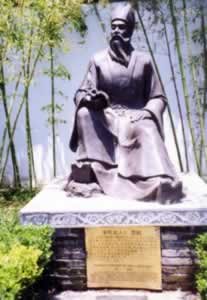| About China > History > Celebrities |
|
|
Su Shi
The poems and lyrics of Su Shi (1037-1101), often known as Su Dongpo, were of a virile timbre and an unrestrained spirit.
He fully demonstrated his preeminent talent for poem, prose, calligraphy and painting. He was honored as the Four Great Masters in the Song Dynasty with Huang Tingjian, Mi Fu and Cai Xiang. After studying the style of Wang Xizhi, he studied the style of Yan Zhenqing and Yang Ningshi. His calligraphy executed smooth strokes with natural atmosphere. He was also skillful at painting bamboo and old trees. His works were included in "The collections of Dongpo", etc.
Most of Su Shi's poems were written to express his own feelings and sing the beauty of nature. Farewell to Lu Yuanhan Posted to Weizhou, Watching Rainstorms at the Hall of Youmei and Drinking after the Rain on the Lake are classic poems with an imagination unbounded, written in either powerful or refined and delicate strokes. His Poem on the Wall of Xilin Temple was considered to have fully captured the realism of Song Dynasty poetry. On Paintings of Wang Wei and Wu Daozi, Reading Meng Jiao's Poems, and On Paintings of Wang, Assistant Magistrate, take art criticism' as their subject matter, raising the culture of Song Dynasty to new heights.
Compared to his poems, Su Shi's lyrics made an even greater impact in terms of creativity. He went beyond merely describing sorrows felt by parting lovers and broadened his canvas to include recollections of the past, travel notes and reasoning, sweeping aside the gentle and restrained style of the lyrics created in the late Tang Dynasty and Five Dynasties period, to establish the powerful and free school of lyrics.
Prelude to a Water Melody and Charm of a Maiden Singer are thought to best represent the style of Su Shi's lyrics. Prelude to a Water Melody imagines extreme loneliness in heaven and entrusts the poet's hopes in securing eternal happiness in the earthly world. Charm of a Maiden Singer expresses the poet's uplifting sentiments by describing the grand view at the former site of the Red Cliff and praising the mettle of ancient heroes. Both poems were written at a time when the poet was frustrated in his career, there fore a tone of "life is but a dream" may be sensed now and then in the poems. Still, this cannot stifle the poet's enthusiasm and optimism conveyed in the poems.
Su Shi, his father Su Xun and younger brother Su Che were known as the "Three Sus". Su Shi was a master of all literary forms, including poetry, lyrics, Fu and prose essays. 2,400 poems and lyrics by Su survive, many of them vivid evocations of the poet's own experiences. |
||||
 |
